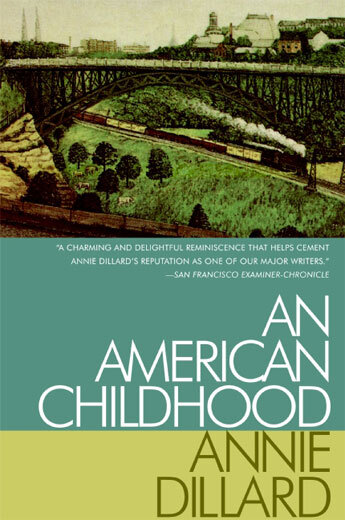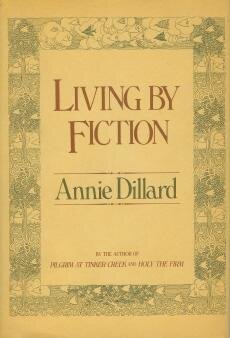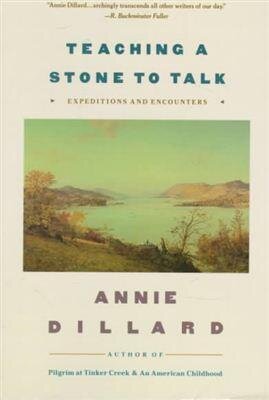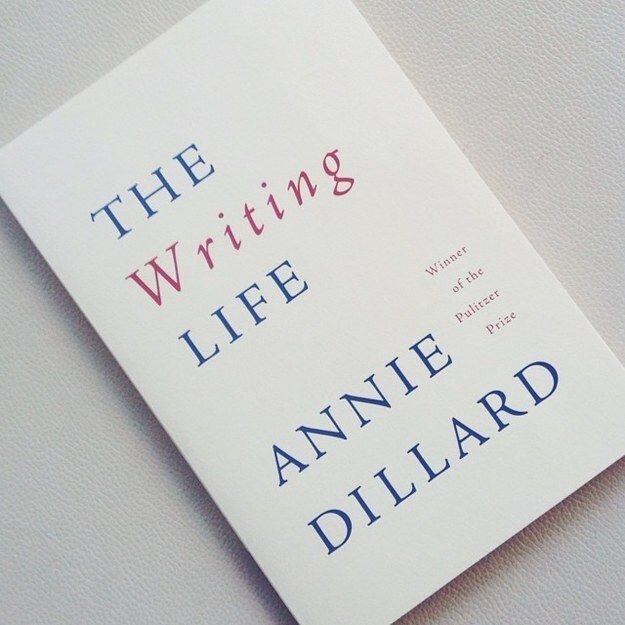ANNIE AT THE CREEK
TINKER CREEK, VA — The creek flowed for millions of years but the world beyond its banks was too busy to notice. Then in 1971, a young woman from nearby Roanoke began dropping by.
She called herself “a fugitive and a vagabond, a sojourner seeking signs.” “I am no scientist,” she wrote. “I explore the neighborhood.“ She spent two years along the creek, wandering, studying, jotting thoughts. No body of water since Walden Pond had enjoyed such a loyal bard. And when A Pilgrim at Tinker Creek came out in 1974, American letters had found the “true heir” to Thoreau.
Annie Dillard worried that she had "shot my lifetime wad. Pilgrim is not only the wisdom of my 28 years but I think it's the wisdom of my whole life.” Yet she grew into “the writing life,” tapping her inquisitive soul to write essays, novels, poetry, a memoir of childhood, even a book about writing. Readers marveled. How could a mind contain such multitudes?
She was born in Pittsburgh, into “a house full of comedians.” Her mother was delightful and defiant. “She taught us to curtsy, she taught us to play poker.” During the McCarthy era, Dillard recalled in An American Childhood, her mother filled out a job application. Asked “Do you favor the overthrow of the government by force or violence?” her mother thought a moment, then wrote. . . Violence.
Her father was an oil company executive by day, a Bohemian dreamer by night. Tall and lean, Frank Doak had played drums in a jazz band, started a novel, smoked marijuana before it became popular, and in middle age quit his job to sail downriver to New Orleans.
Encouraged to wonder, Annie grew up a reader, a dabbler, a tomboy. At college in Virginia she married her poetry professor, R.H.W. Dillard, wrote her Master’s thesis on Thoreau, then went in search of adventures. When she discovered Tinker Creek, rivers already flowed inside her.
Playful but profound, Dillard observed insects and came away disgusted yet amazed. She imagined a time lapse film of earth’s creation and envisioned all the burrowing life beneath the tree where she stood. No sentimentalist, she saw a hard-bitten yet wondrous Nature, bountiful creator of butterflies and bats and beetles, yet cruel enough to kill them all.
“I had been my whole life a bell, and never knew it until at that moment I was lifted and struck.”
Watching a mockingbird fall, then fly, she spun a worldview. “The fact of his free fall was like the old philosophical conundrum about the tree that falls in the forest. The answer must be, I think, that beauty and grace are performed whether or not we will or sense them. The least we can do is try to be there.”
After being there long enough to fill 20 notebooks, Dillard retired to a library carrel. Fueled by coffee, Coke, chocolate milk, and cigarettes, she crafted her journal into fifteen chapters that spanned a year at Tinker Creek. She took time out to grab her baseball glove and play second base with some boys on a nearby diamond. She wrote and wrote, often past midnight.
Much of the writing came easily, “as though I were copying from a folio held open by smiling angels.” And when she finished, she opened the blinds, and thought, “Oh yes, the world.”
A Pilgrim at Tinker Creek won the Pulitzer Prize and won reader’s hearts. Eudora Welty praised Dillard’s “sense of wonder so fearless and unbridled.” Edward Abbey made the comparison to Thoreau. Dillard was old enough to be flattered, young enough to be terrified. “I'm starting to have dreams about Tinker Creek,” she said. “Lying face down in it, all muddy and dried up and I'm drowning in it."
Yet she was soon exploring other neighborhoods. In the Pacific Northwest, she lived on an island and wrote her next book, Holy the Firm, turning a young girl’s tragic death into an affirmation of life. She watched a total eclipse of the sun (I saw that one, too), gawking as “this disk of sky slid over the sun like a lid.” She dove into books about polar explorers, Chinese writers, cosmology, and assorted versions of God. She explored the Galapagos, Cape Cod, tributaries of the Amazon.
Dillard finally settled in Connecticut where she taught creative writing at Wesleyan. She married a Thoreau scholar — you can’t make this up — and tried her hand at fiction. Now 76, she has a whole shelf of her own works but also stacks of books she can’t wait to explore. “I can no longer travel,” her website explains, “can't meet with strangers, can't sign books but will sign labels with SASE, can't write by request, and can't answer letters. I've got to read and concentrate. Why? Beats me.”
Back near Roanoke, Tinker Creek flows on. No one comes by much anymore. That, it seems, is how the creek’s bard wanted it. “It has always been a happy thought to me that the creek runs on all night, new every minute, whether I wish it or know it or care, as a closed book on a shelf continues to whisper to itself its own inexhaustible tale.”












